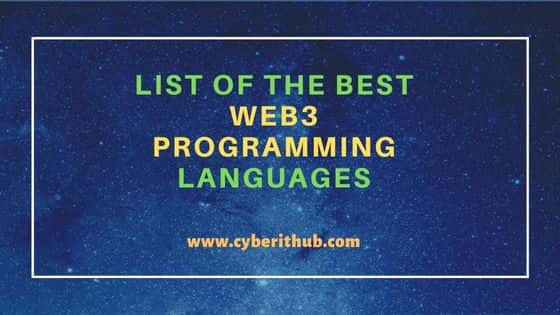Table of Contents

It takes patience, dedication, and time to learn a new language. But, the term only really sticks in your mind when used appropriately. The blockchain environment's most widely used programming languages are starting to gain traction.
Web development services cover all aspects of creating a web-based solution, whether it be a straightforward text page or a sophisticated online application. With huge development potential, users are eagerly searching the web for information about web3 computer languages and similar technologies.
The remarkable increase in acceptance of web3 and blockchains was noted by both ambitious company owners and software specialists. You may choose from a variety of web3 programming languages, each with unique applications, advantages, and trade-offs.
Best Web3 Programming Languages
Learning the several Web3 programming used in the sector is a wonderful place to start if you wish to work as a blockchain programmer.
#1: Solidity
Solidity is a greater, detailed language of programming created specifically for the Ethereum network's smart contracts.
It is a system that has been influenced by well-known programming languages including Python, JavaScript, and C++.
The language is used to design blockchain networks that carry out business rules and manage a string of transactional data.
It was built expressly to interact well with EVM.
EVM or Ethereum Virtual Machine also uses it as a translator for machine-level code.
For a variety of applications, including voting methods, outsourcing systems, etc. Developers may build contracts using this.
To preserve the precision and determinism of digital currencies, Reitwiessner, Beregszaszi, and several previous developers of the Ethereum core created Solidity.
The language uses blockchain organizations with several advantages.
This includes developer friendliness, support for JavaScript infrastructures, and availability of debuggers and other crucial tools.

#2: Vyper
Pythonic computer language Vyper is geared at the Ethereum Platform and developed for smart contracts.
It makes it easier to create smart contracts that are compatible with the EVM and is strongly impacted by Python.
A language built on the blockchain that enables the creation and execution of smart contracts without the requirement for centralized intermediaries.
Maximizing smart contract security is a goal of Vyper.
It was developed to be a better version of the Ethereum self-executing language Solidity, lowering possible risks and enhancing readability.
The Vyper blockchain computer language features a specific structure that forbids the usage of risky design patterns.
Such patterns, however, are guaranteed to fail verification tests by Vyper.
#3: Go
In order to improve programming efficiency in a society of multicore computers, networked systems, and huge codebases, Griesemer, Pike, and Thompson developed the Go computer language in 2007.
Although Go has CSP-style parallelism, structural type, trash collection, and memory safety, it is grammatically identical to C.
Its official name is Go, but because of its former web address, golang.org, it is frequently referred to as Golang.
The designers of the language were inspired by Python's effectiveness and simplicity as well as C's strength.
They wanted to fix the shortcomings of earlier Google languages while keeping their beneficial aspects.
Go is a great option for blockchain development since it has special features and skills. For instance, it simplifies the process of creating powerful and effective apps.
It also converts programs to computer code and individual binaries support a wide range of platforms and processor architectures and enables rapid server infrastructure deployment.
The two most popular blockchain technologies built on the Go programming language are Go-Ethereum and Hyperledger Fabric.
#4: Rust
Several paradigms are supported by the general-purpose programming language Rust.
It promotes concurrency, speed, and type safety, making it a reliable, quick, and memory-efficient language.
Rust is a popular option for system development because it has high-level capabilities including functional programming structures.
Software engineer Graydon Hoare developed Rust in 2006 as a side endeavor while employed at Mozilla Research. Mozilla formally backed the project in 2009.
Rust provides free abstractions and by default adheres to the finest development and design principles.
Its lack of a garbage collector, compatibility with C and C++, and support for embedded devices all contribute to its top-notch speed.
Due to its various benefits, this programming is preferred by hundreds of companies globally.
After the very first release in Jan 2014, corporations such as Amazon, FB, Google, etc. adopted Rust.
The software program Rust is perfect for use in systems where performance and dependability are crucial.
It is an excellent option for blockchain development since it is simple to use, quick, reliable, and memory-efficient.
#5: Simplicity
A wide blockchain program code called Simplicity was released in Nov 2017 and was created by Russell O'Connor.
It is an application-specific operational, typed, combinator-based language created for cryptocurrency and blockchain use.
Its objective is to improve current cryptocurrency languages while resolving problems with Ethereum's EVM and Bitcoin Script.
Coq, a popular all-purpose software proof helper, supports formal denotational semantics, which brings simplicity.
Being an abstract instrument that estimates the computing time and space needs for program evaluation, the Bit MachineA also provides operational semantics.
Simplicity may be subjected to static analysis because of its Turing insufficiency, which enables the formulation of upper bounds on computing resources prior to execution.
This property makes it useful for developing "smart contracts" for blockchain applications.
Together with its capacity to describe any economic activity even when Turing is not perfect.
Simplicity may be used to establish sidechains or separate blockchains and is interoperable with the majority of open-source, sidechain-capable blockchain technologies.

#6: Ruby
Ruby is the best language to start your career as a blockchain developer.
Ruby is a greater, overall computer program that was developed by Yukihiro "Matz" in the middle of the 1990s.
Ruby enables developers to quickly prototype their ideas utilizing accessible third-party APIs and extensions.
Moreover, Ruby may be used with other languages to produce platforms with greater sophistication.
Several Asian developers use Ruby for building blockchain-based platforms and applications.
Because of its cross-platform interoperability, accessibility of using it, developer-friendly design, and clarity in system memory.
It is a perfect choice for people that need to construct a blockchain solution rapidly.
Conclusion
It may be intimidating to learn a new programming language, but it is obvious that there will be plenty of job opportunities. As the blockchain sector spreads into the metaverse for those who take on this task. The Web3 developer environment is expanding and in high demand.
It might be difficult to choose the finest Web3 programming language, but it's important to take into account how efficient the language will be in developing your particular Web3 application as the usage of blockchain technology increases across numerous sectors.

